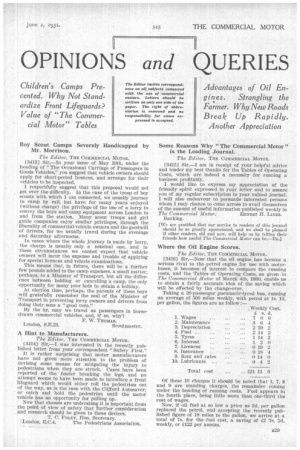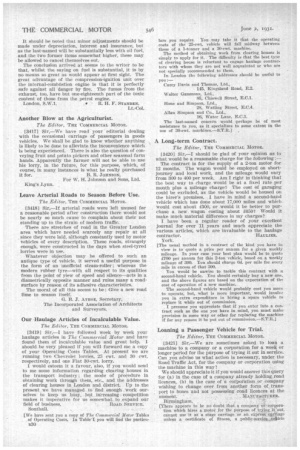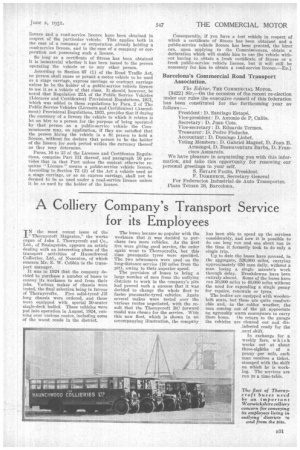OPINIONS
Page 47

Page 48

Page 49

If you've noticed an error in this article please click here to report it so we can fix it.
and QUERIES Boy Scout Camps Severely Handicapped by Mr. Morrison.
The Editor, THE COMMERCIAL Alaron.
[3413] Sir,—In your issue of May 19th, under the heading of ." The Occasional Carriage of Passengers in Goods Vehicles," you suggest that vehicle owners should apply for short-period licences, and arrange for their vehicles to be inspected.
I respectfully suggest that this proposal would not get over the difficulty. In the case of the troop of boy scouts with which I am connected, we usually journey to camp by rail, but have for many years enjoyed (without charge) the privilege of the use of a lorry to convey the boys and camp equipment across London to and from the station. Many scout troops and girl guide companies enjoy similar privileges, through the liberality of commercial-vehicle owners and the goodwill of drivers, for we usually travel during the evenings and Saturday afternoons.
In cases where the whole journey is made by lorry, the charge is usually only a nominal one,, and in these circumstances we cannot expect that vehicle owners will incur the expense and trouble of applying for special licences and vehicle examinations.
This means that, in future, there will be a further few pounds added to the camp expenses, a small matter, perhaps, to a Minister of Transport, but all the difference between holding or cancelling a camp, the only opportunity for many poor lads to obtain a holiday.
At election time, perhaps, the parents of these boys will gratefully remember the zeal of the Minister of Transport in preventing lorry owners and drivers from doing their sons a "good turn."
By the by, may we travel as passengers in horsedrawn commercial vehicles, and, if so, why?
F. W. THOMAS. London, S.E.23. Scoutmaster.
A Hint to Manufacturers.
The Editor, THE COMMERCIAL MOTOR.
13414] Sir,—I was interested in the recently published letter from your correspondent "Safety First." It is rather surprising that motor manufacturers have not given more attention to the problem of devising some means for mitigating the injury to pedestrians when they are struck. Cases have been reported of the fender breaking the legs, and no attempt seems to have been made to introduce a front lifeguard which would either roll the pedestrian out of the way, as is the Case with the Clifford AHIosaver, or catch and hold the pedestrian until the motor vehicle has an opportunity for pulling up.
Now that chassis are underslung it is important from the point of view of safety that further consideration and research should be given to these devices.
T. C. FOLEY, lion. Secretary. London, E.C.4. The Pedestrians Association.
Some Reasons Why "The Commercial Motor" is the Leading Journal.
The Editor, THE COMMERCIAL MOTOR.
[34151 Sir,—I am in receipt of your helpful advice and tender my best thanks for the Tables of Operating Costs, which are indeed a necessity for running a business profitably.
I would like to express my appreciation of the friendly spirit expressed in your letter and to assure you of my regular subscription to your valued journal..
I will also endeavour to persuade interested persons whom I may chance to come across to avail themselves of the amount of useful information published weekly in
The Commercial Motor.' ERNEST IL LINES. Barking.
[We are gratified that our service to readers of this journal should be so greatly appreciated, and we shall be pleased if other readers, old and new, will help us by telling their friends how useful The Comrnerciai Motor can be.--Enj Where the Oil Engine Scores.
The Editor, THE COMMERCIAL MOTOR.
[34161 Sir,—Now that the oil engine has become a serious rival to the petrol engine for use with motorbuses, it becomes of interest to compare the running costs, and the Tables of Operating Costs, as given in The Commercial Motor of Mardi 4th, 1930, enable us to obtain a fairly accurate idea, of the saving which will be effected by the change-over.
Taking a 26-passenger pneumatic-tyred bus, running an average of 500 miles weekly, with petrol at 1s. Id. per gallon, the figures are as follow:—
Of these 10 charges it should be noted that 1, 7, 8 and 9 are standing charges, the remainder coming under the heading of running costs. Fuel appears in the fourth place, being little more than one-third the cost of wages.
Now, if oil fuel at so low a price as 3d. per gallon replaced the petrol, and accepting the recently pub]ished figure of 18 miles to the gallon, we arrive at a total of 7s. for the-fuel cost, a saving of £2 7s. 2d. weekly, or £122 per annum. It should be noted that minor adjustments should be made under depreciation, interest and insurance, but as the last-named will be substantially less with oil fuel, and the two former items somewhat higher, these may be allowed to cancel themselves out.
The conclusion arrived at seems to the writer to be that, whilst the saving on fuel is substantial, it is by no means so great as would appear at first sight. The great advantage of the compression-ignition unit over the internal-combastion engine is that it is perfectly safe against all danger by fire. The fumes from the exhaust, too, have but one-eighteenth part of the toxic content of those from the petrol engine.
London, S.W.1. • R. H. F. STANDEN, Lt.-Col.
Another Blow at the Agriculturist.
The Editor, THE 'COMMERCIAL MOTOR.
[3417] Sir,—We have read your editorial dealing with the occasional carriage of passengers in goods vehicles. We shall be glad to know whether anything is likely to be done to alleviate the inconvenience which is being experienced. There is also the question of conveying fruit and potato pickers and other seasonal farm hands. Apparently the farmer will not be able to use his lorry, in the future, for this purpose, which, of course, in many instances is what he really purchased it for. B. R. JOHNSON, For W. H. Johnson and Sons, Ltd.
King's Lynn.
Leave Arterial Roads to Season Before Use.
The Editor. THE COMMERCIAL MOTOR.
[3418] Sir,—If arterial roads were left unused for a reasonable period after construction there would not be nearly so much cause to complain about their not standing up to the strain of modern traffic.
There are stretches of road in the Greater London area which have needed scarcely any repair at all since they were laid, although constantly used by motor vehicles of every description. These roads, strangely enough, were constructed in the days when steel-tyred lorries were in use.
Whatever objection may be offered to such an antique type of vehicle, it served a useful purpose in the form of an unofficial steam-roller ; whereas the modern rubber tyre—with all respect to its qualities from the point of yiew of speed and silence—acts in a diametrically opposite manner and ruins many a roadsurface by reason of its adhesive characteristics. The moral of all this seems to be: Give a new road time to season itself.
G. B. J. ATHOE, Secretary,
The Incorporated Association of Architects and Surveyors.
Our Haulage Articles of Incalculable Value.
The Editor, THE COMMERCIAL MOTOR.
[3419] have followed week by week your
haulage articles in The Commercial Motor and have found them of incalculable value and great help. I should be very pleased if you will forward me a copy of your Operating Costs Tables. At present we are running two Chevrolet lorries, 25 cwt. and 30 cwt. respectively, and one Fiat 30-cwt. lorry.
I would esteem it a favour, also, if you would send to me some information regarding clearing houses in the transport industry ; the mode of procedure in obtaining work through thein, etc., and the addresses of clearing houses in London and. district. Up to. the present we have managed to "find enough work ourselves to keep us busy, but..in:creasing competition makes it imperative for us somewhat to expand our field of business, •: ROAD SERVICE. Southall.
[We have sent you a copy of The Commercial Motor Tables , of Operating Costs. In Tablel you will find the partici], B30
Jars you require. You may take it that the operating costs of the 25-ewL vehicle will fall midway between those of a 1-tonner and a 30-cwt. machine.
The method of obtaining work from clearing houses is simply to apply for it. The difficulty is that the best type of clearing house is reluctant to engage haulage eon trac tors with whom they are not well acquainted or who are not specially recommended to them. In London the following addresses should be useful to you :— Carey Davis and Thomas, Ltd., 145, Kingsland Road, E.2.
Walter Gammons, Ltd., 85, Chiswell Street, B.C.I.
Hone and Simpson, Ltd., .
28, Watling Street, Allan Simpson and Co., Ltd., 10, Water Lane, E.C.8.
The last-named concern would perhaps be of most assistance to you, as it specializes to some extent in the use of 30-cwt. inachines.—S.T.R.]
A Long-term Contract.
The Editor, THE COMMERCIAL MOTOR.
[3420] Sir,—I should be glad of your opinion as to what would be a reasonable charge for the following:— The contract is for the supply of a 2-ton motor for 12 months. The wagon would be employed on shortjourney and local work, and the mileage would vary from 300 to 400 per week. Am I right in thinking that the best way to charge would be at a fixed rate per month plus a mileage charge? The cost of garaging could be excluded, as the vehicle would be housed on the hirer's premises. I have in mind a second-hand vehicle which has done about 17,000 miles and which. would cost about £300, or would it be better to purchase a new, wagon costing about £650? Would it make much material difference in my charges?
I have been a regular reader of your excellent journal for over 11 years and much appreciate the various articles, which are invaluable to the haulage contractor. HAULIER. York.
[The usual method in a contract of the kind you have in view is to' quote a price per annum for a given weekly mileage. In your case your best plan would be to quote £700 per annum for this 2-ton vehicle, based on a weekly mileage of 300. You should charge Gd. per mile for every mile in excess of that 300.
• You would be unwise to tackle this contract with a second-hand vehicle. You should certainly buy a new one, and the above figures are based on the expectation of the cost of operation of a new machine.
The second-hand vehicle would probably cost you more to operate, but, what is more important, would involve you in extra expenditure in hiring a spare vehicle to replace it while out of commission.
. I presume you appreciate that if you enter into a contract such as the one you have in mind, you must make provision in some way or other for replacing the machine if for any reason it be put out of commission.—s.P.R.1
Loaning a Passenger Vehicle for Trial.
The Editor, THE COMMERCIAL MOTOR.
[3421] Sir,—We are sometimes asked to loan a machine to a company or a corporation for a week or longer period for the purpose of trying it out in service. Can you advise us what action is necessary, under. the Road Traffic Act, for-the company or corporation Using the machine in this way ?
We should appreciate it if you would answer this query for (a) in the case of a company already holding road licences, (b) in the case of a corporation or company wishing to change over from another form of. transport to buses and not possessing. Tend licences at the
niornent: . MANUFACTURER.
Birmingham. . . .
[There appears to be no doubt that a company or•eorporation which hires a 'motor for the purpose of trying.it'out, cannot use it as a stage 'carriage or an eXPre-siCeAr'4age unless a certificate of fitness, a public-se.r.vi.ftaddcle
licence and a road-service licence have been obtained in respect of the particular vehicle. This applies both in the case of a company or corporation ,already holding a road-service licence, and in the case of a company or corporation not possessing such a licence. .
So long as a certificate of fitness has been obtained it is immaterial whether it has been issued to the person operating the vehicle or to any other person.
According to Section 67 (1) of the Road Traffic Act, no person shall cause or permit a motor vehicle to be used as a stage carriage, express carriage or contract carriage unless he be the holder of a public-service vehicle licence to use it as a vehicle of that class. It should, however, be noted that Regulation 22A of the Public Service Vehicles (Licences and Certificates) Provisional Regulations, 1931, which was added to those regulations by Para. 2 of The Public Service Vehicles (Licences and Certificates) (Amendment) Provisional Regulations, 1931, provides that if during the currency of a licence the vehicle to which it relates is let on hire to a person for the purpose of being operated by that person as a public-service vehicle the Commissioners may, on application, if they arc satisfied that the person hiring the vehicle is a fit person to hold a licence, without fee declare that person to be the holder of the licence for such period within the currency thereof. as they may determine.
-Pants. 16 to 23 of the Licences and Certificates Regulations, comprise Part III thereof, and paragraph 16 provides that in that Part unless the context otherwise requires " Licence " means a public-service •vehicle licence. According to Section 72 (2) of the Act a vehicle used as a. stage carriage, or as an express carriage, shall not be deemed to be so used under a road-service licence unless it be so used by the holder of the licence. Consequently, if you have a test vehicle in respect of which a certificate of fitness has been obtained and a public-service vehicle licence has been granted, the hirer can, upon applying to the Commissioners, obtain a declaration which will enable him to use the vehicle without having to obtain a fresh certificate of fitness or a fresh public-service vehicle licence, but it will still be necessary for him to obtain a road-service licence.—En.]
Barcelona's Commercial Road Transport Association.
The Editor, MB COMMERCIAL 110T01t.
[3422] Sir,—On the occasion of the recent re-election
under our rules the executive council of this federation has been constituted for the forthcoming year as follows :— President : D. Santiago Estape.
Vice-president : D. Antonio de Pi Calls.
Secretary: D. Juan Cots.
Vice-secretary: D. Eduardo Termes.
Treasurer; D. Pedro Piulachs.
Accountant: D. Domingo Llobet.
Voting Members : D. Gabriel Magnet, D. Juan B.
Armengol, D. Buenaventura Barba, D. Fran cisco Asmarats.
We have pleasure in acquainting you with this infor mation, and take this opportunity for renewing our personal greetings to your self.
S. ESTAPE PAGES, President.
F. DOM.ENECII, Secretary General For Federacion Industrial de Auto Transportes.
Plaza Tetuan 26, Barcelona.




































































































